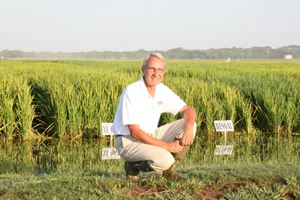|
LSU AgCenter Develops Specialty Rice Varieties
BRUCE SCHULTZ
CROWLEY, LA.
Grain quality is a high priority for university rice breeding programs, although yield is an important part of the equation used in developing new varieties, according to Dr. Steve Linscombe, LSU AgCenter rice breeder and director of the LSU AgCenter Rice Research Station.
“The pure-line varieties out there right now for the most part have very high quality with the same cereal chemistry characteristics that the southern long-grain variety standard was based on,” Linscombe said.
Linscombe said quality is considered early in the breeding process. “It’s a big part of what the breeders do. We don’t only place emphasis on yield.”
He said cereal chemistry is analyzed to determine factors such as gel temperature, amylose content and cooking characteristics.
“That’s a very large part of what all the breeding programs do.”

Dr. Steve Linscombe, LSU AgCenter
rice breeder and director of the
LSU AgCenter Rice Research Station,
stresses that although yield is an important
factor, quality is a high priority for university
rice breeding programs.
A new cereal chemistry lab is now operating at the Rice Research Station under Dr. Ida Wenefrida that enables a quick analysis of breeding lines that are being reviewed for development. Linscombe said the equipment will enable him to make decisions sooner about which lines should be kept in variety development. “It makes it easier from the standpoint of turnaround time.”
Linscombe said the lab, funded by rice farmers’ check-off dollars, streamlines the breeding process and eliminates backlogs
Even if a breeding line has good quality and yield potential, other factors can prevent breeders from bringing that line to commercial availability.
“You could fill an entire page with all the characteristics we are looking at beyond yield.”
For example, a hybrid line at the Rice Research Station named LAH10 has consistently out-yielded commercial hybrids, and it shows good quality characteristics. “It will probably never be commercialized because it’s too tall.”
But yield is an important factor, particularly under the current market structure, Linscombe said.
He said farmers have no choice but to grow rice that produces high yields. “Producers are interested in the bottom line. If they are paid the same, they will grow what makes the most money.”
“That’s the situation in place for the market until the mechanism is in place for producers to be rewarded for growing a higher quality variety that might not yield as much.”
Concern about quality issues came to the surface in 2010 when the crop was stressed by abnormally hot weather.
But a less-than-optimum growing season does not automatically result in bad quality, and 2014 is proving to be a good example of that. Linscombe and others have been surprised by this year’s crop.
“Quality was good last year, and this year at this point it’s been as good as or better than last year,” said Linscombe. “I’m amazed we’ve got as good of a crop as we have.”
Weather was not ideal for growing rice, with a late spring and heavy rain. The Rice Research Station recorded 33.6 inches of rain between May and August, compared to 13.2 inches last year.
And yields have been better than expected too, although harvest has been complicated by frequent rainfall and muddy fields, Linscombe said.
John Morgan, vice president of Louisiana Rice Mill, agreed with Linscombe’s assessment of quality.
“This year’s quality is the best I’ve seen in 10 years,” Morgan said.
Morgan said a task force formed after the 2010 crop has increased awareness of the quality issue, and the LSU AgCenter breeding program is responsive to the industry’s needs.
Morgan said some of the quality issues involve the wide range of several varieties, with varying grain shapes, that are mixed in batches to be milled, resulting in increased broken and cracked grains.
Tim Walker, general manager of Horizon Ag and former rice breeder at Mississippi State University, said quality is a major consideration at university breeding programs.

Tim Walker, general
manager of Horizon Ag
and former rice breeder
at Mississippi State
University, said quality
is a major consideration at university breeding
programs. “I don’t know
of any varieties released
during my career that
don’t meet the minimum milling standard
of 55/70,” Walker said. “Most varieties are
milling above that.”
“I don’t know of any varieties released during my career that don’t meet the minimum milling standard of 55/70,” Walker said. “Most varieties are milling above that.”
And Walker said a USA Rice Federation study showed varieties have good quality.
“The reality is our growers are not being paid all the time for quality.”
He said growers are rewarded for high yields over quality, which naturally leads growers to plant high-yielding selections.
He said in order for quality to be given a high priority on the grower level, “It has to be rewarded at the farm gate, and it’s not happening right now.” ∆
BRUCE SCHULTZ: Assistant Communications Specialist, LSU AgCenter
|
|